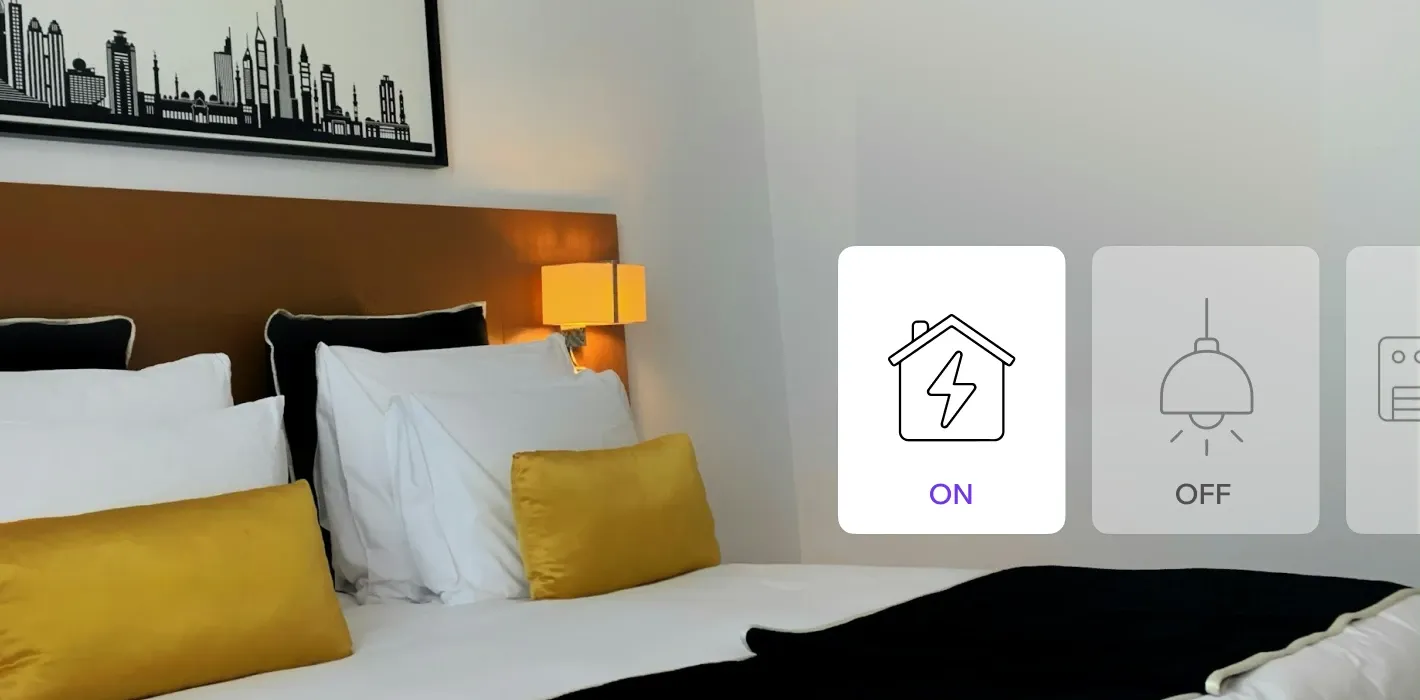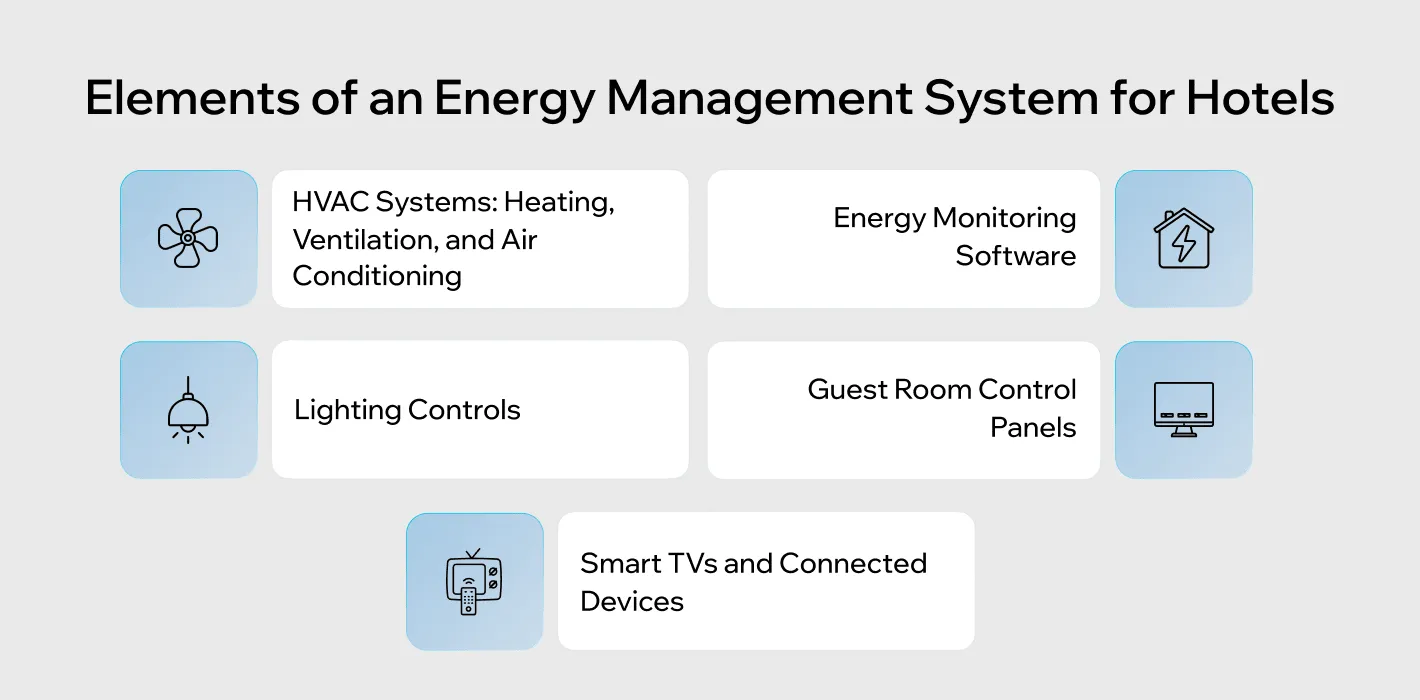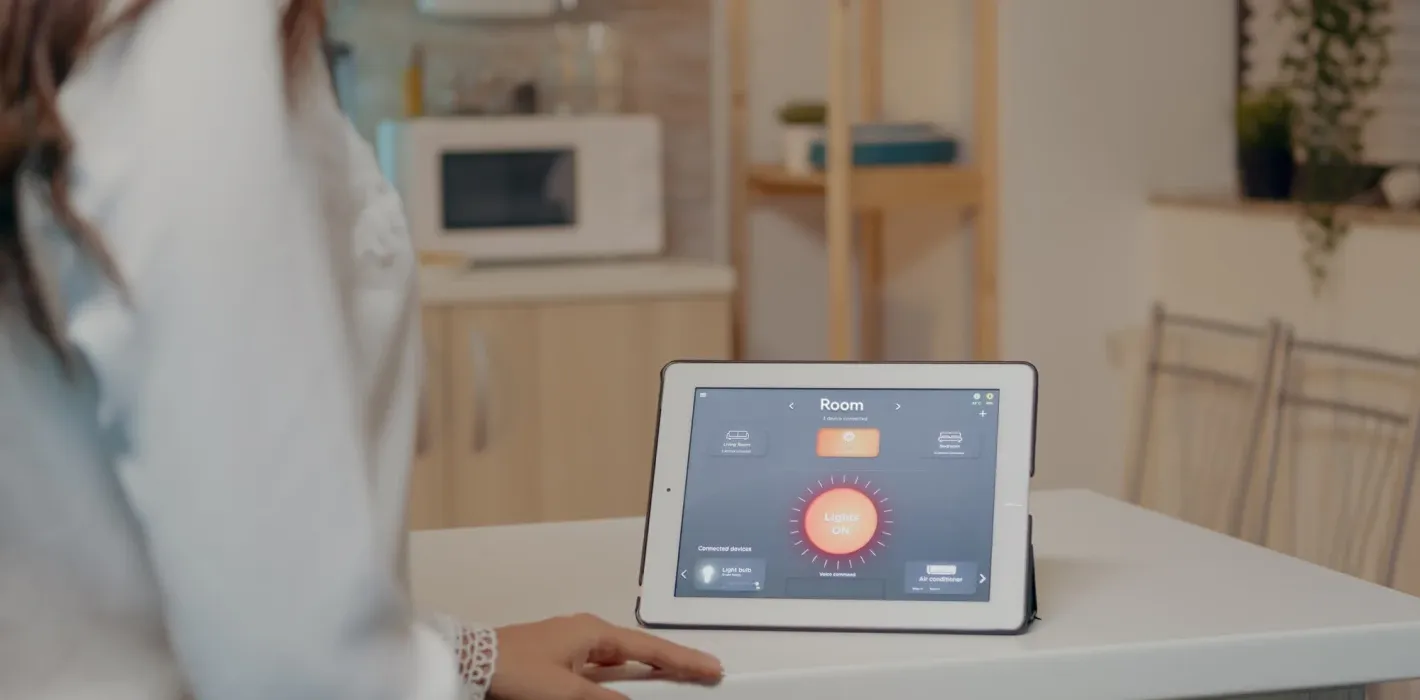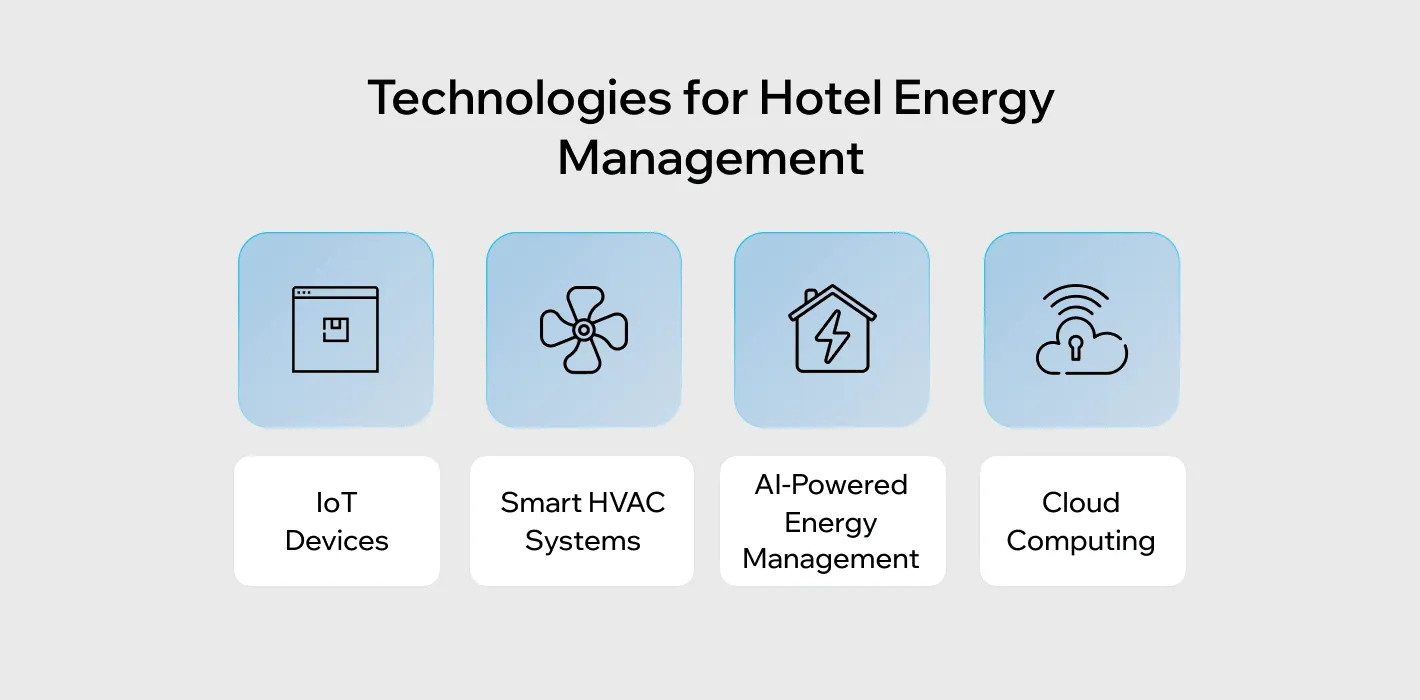

Hotels can improve energy management by incorporating smart technologies like IoT devices, automated controls, and even smart TVs.
By adopting hotel energy management practices today, you can reduce operational costs and create a more sustainable footprint while keeping your guests satisfied.
In this article, we’ll talk about the importance of sustainable energy management in the hotel industry and why now is the time to invest in advanced hotel energy management systems.

Hotel energy management is all about controlling and minimizing energy consumption without sacrificing guest comfort. From lighting to heating and air conditioning, hotels need to manage electricity and other resources effectively while ensuring that guests still enjoy a seamless experience.
Hotels can now monitor and optimize energy use in real-time. Technologies like motion sensors, the Internet of Things (IoT), and cloud-based platforms help track energy consumption across the entire property. This enables better control over energy distribution, reducing waste without compromising service quality.
Example: A smart sensor detects when a guest leaves the room, automatically adjusts lights or temperature to conserve energy.
In short, energy management in the hotel industry means using the latest technologies to strike the perfect balance between energy savings and guest satisfaction. With the right systems in place, hotels can reduce their carbon footprint and boost their bottom line, making it a win-win for everyone.
A hotel energy management system combines a range of tools and technologies to effectively control energy use while enhancing guest comfort.
 Let’s break down the key components:
Let’s break down the key components:
Smart thermostats in HVAC hotel energy management systems adjust temperature and airflow based on guest activity. When guests enter or leave, the system automatically adjusts the room temperature and lighting to use less energy without compromising comfort. This is a massive improvement for energy management in the hotel industry, helping hotels reduce costs while keeping guests happy.
Automated lighting is another powerful tool for energy efficiency in hotels. Motion sensors detect when guests enter or leave a room, turning lights on or off accordingly. This simple feature significantly reduces energy waste and is a key part of hotel energy-saving solutions.
Advanced energy management for hotels also includes energy monitoring software. This software tracks energy usage across the entire property, providing real-time data on where energy is being consumed. With this insight, hotels can make smarter decisions to cut costs and improve efficiency.
Guest room control panels are designed for convenience and to help hotels save energy. These panels allow guests to adjust the temperature, lighting, and even the smart TV from a single location. This aids in hotel energy management by encouraging guests to conserve energy.
Smart TVs are more than just an entertainment feature; they play a role in energy management systems in the hotel industry by communicating with other devices in the room. These TVs can automatically switch to low-energy mode when not in use, which helps contribute to the hotel's overall energy efficiency.
Hotel energy management has become increasingly dynamic, with smart TVs emerging as essential components of hotel energy management systems. These innovative devices contribute significantly to energy efficiency in hotels while enhancing the guest experience.
By minimizing unnecessary energy consumption, smart TVs enable hotel guests to enjoy their stay while also reducing operational costs for management. The integration of hotel energy management systems with smart TVs represents a modern approach that promotes sustainability without compromising guest satisfaction.
One of the standout features of smart TVs is their automated power control. This capability enables independent management of power supply; when guests switch off the TV upon leaving their rooms, the device powers down automatically. This feature not only conserves power but also contributes to the overall efficiency of the hotel's energy management system. By minimizing energy use during guest transitions, hotels can significantly reduce their energy costs.
Smart TVs also come equipped with a low-energy mode, which activates when the device is not in use. This functionality drastically reduces power consumption while the TV is idle, offering a more energy-efficient alternative to traditional television usage. This innovative feature aligns perfectly with the goals of energy management in the hotel industry, allowing for enhanced hotel energy efficiency without sacrificing guest entertainment.
 Furthermore, smart TVs can seamlessly integrate with other room systems, such as thermostats and lighting controls. This integration ensures coordinated energy savings throughout the room, enhancing the energy management process.
Furthermore, smart TVs can seamlessly integrate with other room systems, such as thermostats and lighting controls. This integration ensures coordinated energy savings throughout the room, enhancing the energy management process.
As guests adjust the TV settings, overall energy consumption can be optimized, contributing to a more energy-efficient hotel environment.
Implementing a hotel energy management system brings a range of benefits that go beyond just cutting costs. Here are some key advantages:
One of the biggest perks of using an energy management system in the hotel industry is the significant energy savings it provides. By optimizing energy use, hotels can reduce their electricity and heating costs. This means more money to reinvest in guest services, upgrades, or other essential areas of the property.
By adopting hotel energy-saving solutions, establishments can reduce their energy use and lower their carbon footprint. When energy is used more wisely, it leads to fewer emissions and a positive contribution to sustainability. Today's guests are increasingly eco-conscious, so showcasing your commitment to the environment through effective hotel energy management can enhance your hotel’s appeal.
Establishments that implement hotel energy management systems also enhance the guest experience. With features like smart lighting and automated temperature control, guests can customize their rooms for comfort, while the hotel optimizes energy use in the background. This combination of convenience and sustainability creates a better stay for guests while maintaining hotel energy efficiency.
Many regions have strict energy regulations that hotels must follow. By using a hotel energy management system, properties can ensure they meet government standards and avoid penalties. Staying compliant not only saves money in the long run but also demonstrates that your hotel is responsible and committed to sustainable practices.
Hotels that prioritize energy efficiency and eco-friendly practices tend to build stronger reputations. Today’s travelers, especially business guests and eco-conscious consumers, prefer staying at hotels that care about their environmental impact. By embracing hotel energy management and promoting it, your hotel can attract more bookings from this growing demographic.
As the hotel industry embraces sustainability, advanced technologies play a pivotal role in energy management for hotels.
 Below are some of the most used technologies in the hospitality industry:
Below are some of the most used technologies in the hospitality industry:
Internet of Things (IoT) devices have revolutionized hotel energy management systems. Sensors designed for occupancy monitoring provide real-time data on room usage, enabling hotels to determine when energy should be utilized or conserved.
This smart technology minimizes energy wastage, leading to significant savings in operational costs. By optimizing energy management processes, hotels can reduce their overall energy consumption while providing a comfortable experience for guests.
Modern heating, ventilation, and air conditioning (HVAC) systems are equipped with intelligent controls that automatically adjust temperature settings based on real-time conditions. These room controls can be preset according to prevailing weather, ensuring that guest rooms remain comfortable while maintaining energy use at optimum levels.
By optimizing heating and cooling processes, hotels can conserve energy and enhance guest satisfaction, demonstrating a commitment to hotel energy efficiency.
Artificial intelligence (AI) is transforming energy management for hotels by analyzing historical energy usage data to predict future consumption patterns. By creating an Energy Usage Profile, AI algorithms enable hotels to make informed decisions about energy allocation. This strategic approach leads to substantial energy savings while helping establishments implement hotel energy management systems that are adaptable and efficient.
Cloud computing empowers hotels to securely store and analyze energy usage data, providing managers with valuable insights into consumption trends. This accessibility allows hotel operators to make informed decisions that enhance energy productivity while minimizing costs.
Using cloud technology helps hotels optimize their energy management processes, ensuring a streamlined approach to energy efficiency in the hotel industry.
To maximize operational efficiency, hoteliers must integrate their hotel energy management systems with various other technologies. Here are the main hotel system integrations you must consider:
Property management systems are essential tools that enable hotels to streamline booking management and room preparation for guests. A PMS ensures that energy is utilized only when necessary by synchronizing guest arrivals with room cleaning schedules. For instance, lights and heating are activated only when guests are present, effectively reducing energy consumption and operational costs. This approach highlights the importance of integrating energy management with PMS to create a more efficient environment.
Building Management Systems (BMS) are another critical technology in hotel energy management. They are designed to regulate a hotel's heating, ventilation, air conditioning (HVAC), lighting, and security systems, ensuring optimal energy utilization.
By adjusting settings based on occupancy and the time of day, a BMS helps reduce energy costs while maintaining comfort and safety for guests. This intelligent regulation is a cornerstone of effective energy management in the hotel industry.
Guest Management Systems gather and analyze data related to guest preferences and behaviors. This data can be used during check-in to offer personalized experiences, such as adjusting lighting to match guest preferences. By tailoring the environment to individual needs, hotels can increase guest comfort and promote hotel energy efficiency.
Smart hotel applications empower guests to customize their room conditions with just a touch on their mobile devices. These apps allow guests to easily adjust room temperatures and lighting, enhancing their overall experience. Moreover, they encourage energy-saving behaviors; for instance, guests can switch off lights, dim the lighting, or lower the temperature when leaving their rooms.
This kind of functionality aligns perfectly with the goals of hotel energy management systems, contributing to both guest satisfaction and reduced energy consumption.
Hotel energy management systems make it easy to reduce energy consumption while keeping your guests comfortable. By using smart technologies like IoT devices, automated controls, and hotel energy-saving solutions, you can optimize energy use, lower costs, and enhance your guests' experience.
Is your hotel ready for an upgrade? Start implementing energy management for hotels today, and you’ll see a noticeable drop in your bills while improving service quality.
A hotel energy management system (EMS) is a technology solution designed to monitor, control, and optimize energy consumption throughout a hotel property.
This system helps reduce energy waste, lower operational costs, and support sustainability goals by automating systems like lighting, HVAC, and appliances based on occupancy and usage patterns.
Hotel energy management system installation can involve upfront costs, especially for hardware and integration, but it is generally considered a worthwhile investment.
Over time, it helps reduce energy expenses significantly and improves operational efficiency, leading to long-term savings that often outweigh the initial setup cost.
Yes, absolutely! Many providers offer scalable and cost-effective solutions tailored to smaller properties, helping them reduce energy consumption, lower utility bills, and support sustainability goals without requiring a large investment.
Founder / CEO
Andranik is the CEO and Co-Founder of inoRain OTT and the Co-Founder of HotelSmarters, specializing in next-generation streaming technologies and digital transformation for the hospitality sector. He focuses on building innovative, scalable solutions for video delivery, OTT monetization, and data-driven hospitality management. His work bridges technical sophistication with practical business impact, helping organizations modernize their digital ecosystems and improve operational efficiency.